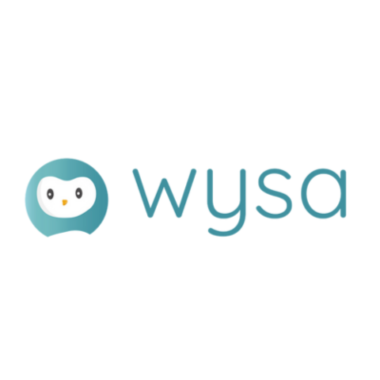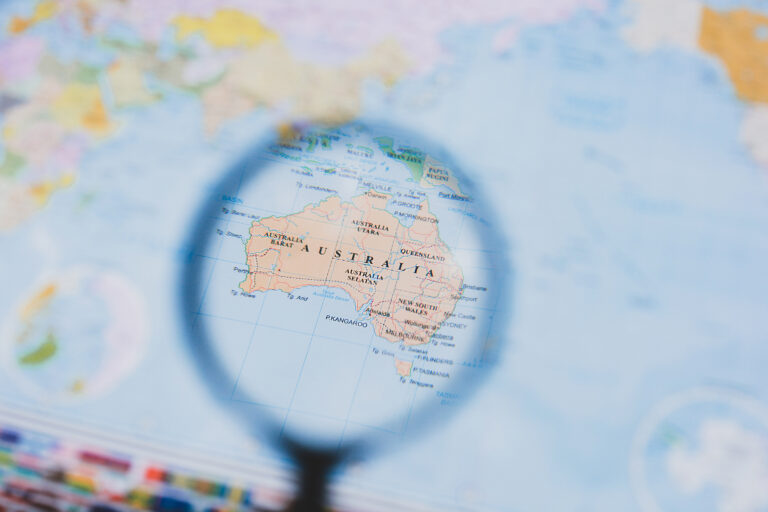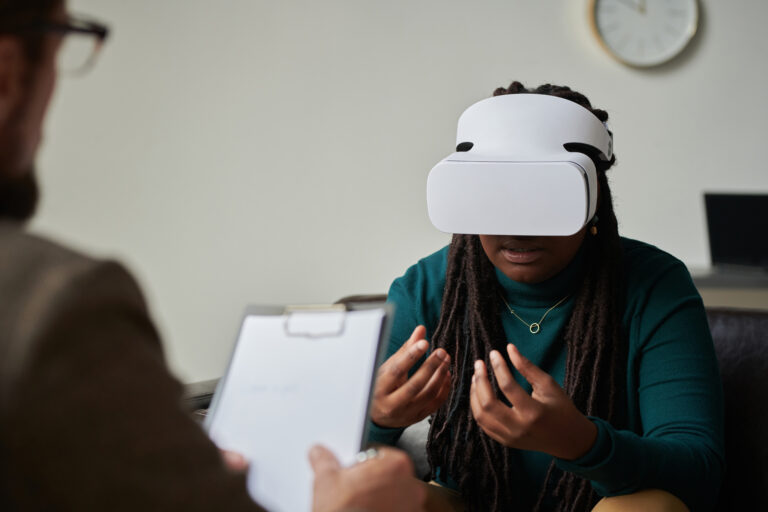What is Wysa?
Wysa is a global leader in AI-driven mental health support, available both to individuals, through employer benefits programmes and healthcare services. We believe access to support should be available whenever people need it. Stigma prevails, so we take away the need for people to ask for help and eliminate the need for people to make a judgement call on when they should seek professional support. Proven to improve depression and anxiety scores by an average of 31%, Wysa’s AI-first approach enables employees to improve their mental health before symptoms become severe, by understanding an individual’s needs and guiding them through interactive cognitive behavioural therapy (CBT) exercises. Wysa’s clinically safe AI encourages users to take additional support, whenever it’s needed, by guiding them towards Wysa’s human coaching, employer benefits programmes (EAP) or national crisis lines. Wysa has helped over 5 million people through 500 million AI conversations across 90 countries
Where did the idea come from?
The idea for Wysa started with founders Jo Aggarwal and Ramakant Vemati’s experiences of personal and family mental ill health. Jo developed a machine learning platform that would analyze all data points to put together a three-dimensional view of someone’s mental health. A clinical trial followed, the results of which proved that by analysing data patterns the app could identify people who were at risk of depression as well as actively helping to improve their mood. Encouraged by the feedback the app was expanded, with elements of Cognitive Behavioural Therapy (CBT) added alongside a library of interactive content and an emotionally intelligent AI-chatbot designed to take this engagement to the next level. Wysa eventually launched worldwide, providing individuals and businesses with the opportunity to tap into its potential.
“Five months after we launched, we got an email from a young girl who said that Wysa was the only thing that was helping her after she attempted to take her own life. She couldn’t speak to anybody else, a 13-year-old girl. And when that happened, I think that was when the penny dropped, personally for me, as a founder. We’ve since received more than 180 personal messages from people who claim the app has saved their lives,” said Ramakant Vempati, Wysa Co-Founder and President.
How does Wysa work?
In practice, Wysa’s AI conversational care guides users through both curated CBT programs and on-demand support. Wysa’s AI is both listening and therapeutic. During the listening stage, Wysa prompts users with open-ended questions to help them reflect and explore their thoughts and feelings. It then leads the user towards the therapeutic stage. At the therapeutic stage, Wysa guides the user through CBT techniques the AI identifies as relevant to that particular user. Wysa has over 120+ natural language understanding (NLU) AI models through which it listens and interprets. This enables users to chat to Wysa using free-text, creating an empathetic interface that is highly engaging and effective for users.
Wysa’s clinical programs bring in a more structured, a programmatic approach offering CBT for specific mental health concerns like depression, panic , anxiety etc and these are based on NICE guidelines. The AI checks in every morning and evening, and can also be supplemented by a human coach or therapist. The programs are clinically validated to reduce symptoms of depression and anxiety. These programs are tailored to increase adherence leading to positive outcomes.
For day-to-day stress, Wysa offers on-demand self-care through 150+ evidence-based exercises, including resources for anxiety, sleep, handling difficult conversations and improving productivity.
How does AI-driven mental health support work differ from other forms of mental health support?
Wysa is always there, even at 4am. A human therapist simply can’t be. Appointments are made within a set schedule and patients are expected to ‘save up’ their worries to discuss. We know that mental health struggles can strike at any time, and people need support whenever and wherever they want and need it.
Users talk freely about their problems without the fear of judgement, and can be open and honest about what’s really going on. Our research shows that people are more likely to open up to AI than humans, and that Wysa creates a therapeutic bond equivalent to that of human therapists in less time.
Given that over half the world are living in areas with less than one psychiatrist for every 250,000 people, and the presence of long waiting lists and resource constraints even in developed economies, solutions like Wysa have used conversational AI to deliver therapeutic support that bridges key gaps in healthcare provision.
At the same time, the ability to engage with a digital solution on a virtual or mobile platform helps address an essential part of inclusivity and equity in access. For instance, individuals belonging to rural communities, or shift workers, may not have access to mental health facilities at times or locations that suit their needs, and an AI chatbot can be a potential solution.
Koda 17, UK “Having the 24/7 support, no matter where I was or what time it is, has been the best thing. I can just pull out my phone and talk through any problems I might be having at the time, like a panic attack.”
How does an AI-first approach enable people to improve their mental health?
Most forms of mental health support are there for people who can no longer function without help, and can only be accessed after someone has asked for help. Or are more for low level symptoms that wellbeing apps that focus on for example meditation can help with. Wysa bridges the gap.
Stigma prevails, all over the world. In our recent study of 2000 Australians we found that 32% of people have clinically significant symptoms of anxiety and/or depression yet nearly half (46%) have not spoken to a mental health professional. Embarrassment, a lack of understanding, and lack of time are the key reasons. We take away the need for people to ask for help and eliminate the need for people to have to make a judgement call on when they should seek professional support.
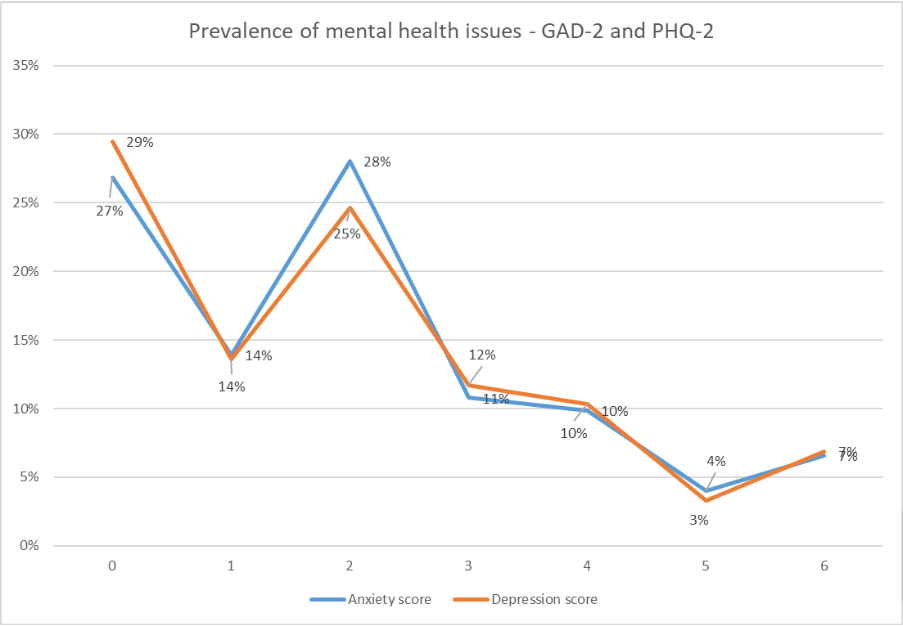
We know that taking that first step is hard, but early intervention is key. Wysa’s AI-first approach enables individuals to improve their mental health before symptoms become severe. Wysa then encourages users to take additional support, depending on need, by guiding people towards Wysa’s human coaching, employer benefits programmes (EAP) or national crisis lines should the need arise.
Wysa’s conversational AI care is shown to reduce symptoms of depression and anxiety by between 27% and 40%, depending on severity. We have both real world and peer reviewed clinical evidence to prove it, with users seeing a significant improvement in mood and positive engagement.
Why is this needed now?
Multiple studies show that workplace mental health deteriorated since covid lockdowns. Adjusting to remote working, then flexible working, and now the threat of office based returns has an impact. But the global economic downturn and threat to jobs also has an impact.
We looked into this on our employee users by analyzing 150,000 conversations that 11,300 employees across 60 countries had with Wysa between July 2021-July 2022. The data shows 32% employees expressed feeling low, bad, numb, depressed, and sad throughout the day and 75% employees reported low to moderate energy on average throughout the day. These levels clearly have an impact on people’s ability to work.
What is particularly alarming is the reported rates of mental ill health, and actual. Our research has demonstrated that the official reported figures often are much lower than the reality. The reason for this is that these figures only look at those who have come forward for treatment. But given that most people don’t ask for help (32% of Australians we screened as positive for clinically significant symptoms of anxiety and/or depression say they didn’t think their symptoms were serious enough and 40% of US employees say they just don’t have time) large swathes of the population aren’t getting the help they need.
That’s before you even get into access needs around location, timings, availability – and the long waiting lists we know can be an issue.
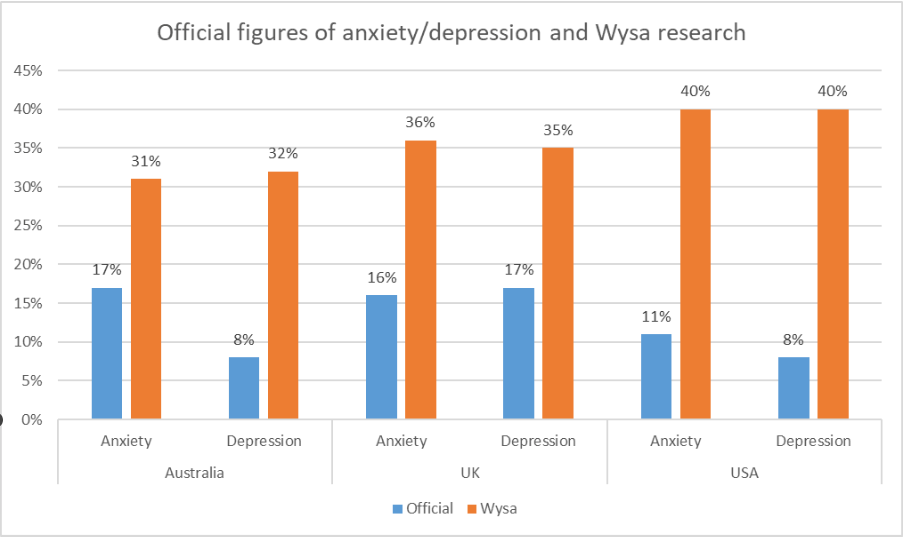
It’s both the scale of the need that is alarming, and the fact that people aren’t getting the help they so desperately require, often due to stigma and shame, that demonstrates the need for solutions that are clinically safe, always available, and always ready.
Wysa and young people
As we hear time and time again in the news, young people are struggling right now. Our Youth Mental Health Report found that need for mental health support is bigger than is being reported – over four in five express worry and anxiety about an issue, and a third suffer symptoms at levels that require professional support and clinical investigation. UNICEF’s report, The State of the World’s Children 2021: On My Mind found that almost one in five European boys aged 15 to 19 suffer from mental disorders, and 16% of girls, and that nine million adolescents in Europe (aged 10 to 19) are living with some kind of mental health condition, with anxiety and depression accounting for more than half of all cases.
Research from both the UK All Worked Up and US version, as well as yet to be published Australian data shows Gen Z are the generation suffering more than any other. 16-24 year olds are more than twice as likely to show clinical signs of depression than those 55+. Half (49%) of students in Australia are screening positively for clinical anxiety, compared to 31% of the general population.
This shows we need to start supporting our young people from an early age. In the UK Youth Report Wysa found that 78% of teens said they would prefer to speak to an app, rather than their teachers. 60% said they would rather consult an app over a doctor. But right now, 3 in 10 turn to TikTok, compared to 2 in 10 to their teachers. Again, nearly half say they are too embarrassed. A third who are getting help say that it’s just not available when they need it, such as before school or late at night. We need to meet them where they are.
Is there an appetite for AI?
AI has made it easier for mental health professionals to detect symptoms and triage patients, refine and confirm diagnoses, and customise treatments based on individual needs and characteristics. Virtual health assistants and chatbots are promoting patient autonomy and self-management, thus making healthcare more affordable and accessible. With the ability to look for patterns in large amounts of data sourced from a variety of sources, AI can help predict trends, identify risk, and improve diagnostic precision. It can pick up on both verbal and non-verbal indicators of psychological distress. From the point of view of users and patients, the agility and non-judgmental nature of AI-guided mental health support has allowed it to be usable, meaningful, and relevant to needs across diverse populations.
The acceptance we have seen of telehealth over the last few years, accelerated by the pandemic, has created the foundations for a public that is generally ready for AI solutions.
In our employee research 74% of employees in the US would rather talk to a clinically validated app than HR, and 68% would prefer an app to a GP. Similar numbers were found with teens in the UK, where 78% would choose an app over their teachers.
Research from EY looking at digital health in America during and after the pandemic found that 83% of physicians are now more comfortable using digital health technologies than prior to COVID-19, citing workflow efficiency and patient safety as key benefits.
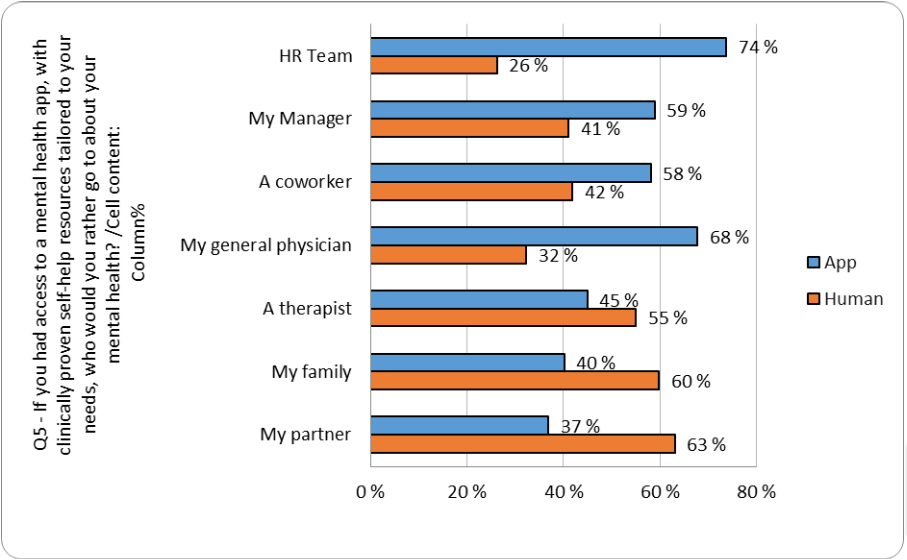
It’s not that AI or technology will replace human support, but be an adjunct to it. It can support people in the gaps of time their therapist can’t. It can free up clinician time spent on admin, so they can focus on delivering care. It can be available any time, and anywhere.
Tyler, 17, Scotland. “My relationship with Wysa, it’s like having a friend who’s always online and ready to speak about whatever. I love the little penguin Ai the app uses, as it feels like I am speaking to someone and not just a robot.”
Wysa for pain
Over the last few years, we’ve conducted extensive research specifically around the relationships between chronic pain and comorbid anxiety and depression. An independent study compared Wysa with the usual orthopedic care and the usual orthopedic care plus in-person psychological counseling for chronic pain sufferers with symptoms of depression or anxiety. Patients who received Wysa as part of their orthopedic care reported greater average improvements in depression, pain interference, and physical function than patients who only received the usual orthopedic care. The most significant discovery was that the patients given Wysa had comparable improvements in depression, anxiety, and pain interference compared to those who received in-person psychological counseling. The app had equivalent or at par results as an in-person psychologist.
Another study aimed to examine the differences in engagement and effectiveness of leveraging an isolated AI digital mental health intervention for users experiencing chronic pain. 51 US adults with self-reported chronic pain and co-existing elevated symptoms of anxiety and/or depression has access to an 8-week Wysa App for Chronic Pain program and acted as the only mental health resource throughout the study. The results showed clinically meaningful improvements in pain interference, physical function, and levels of anxiety and depression.
This resulted in the U.S. Food and Drug Administration (FDA) granting Wysa Breakthrough Device Designation for its AI-based digital mental health conversational agent for patients 18 years and older with a diagnosis of chronic musculoskeletal pain (defined as pain lasting longer than three months) and depression and anxiety.
What’s next?
A new research project will examine the clinical efficacy of Wysa on patients’ symptoms of anxiety and depression during the referral process for standard UK mental health services. Funded via the NIHR/NHSX AI for Health and Care award, the randomised control trial will investigate whether Wysa can support people during this waiting period to manage their mental health.
At the core of what we do is meeting people where they are, when they need help, making mental health support accessible. We want to make sure there are no geographical limitations, so are increasing the languages Wysa is available in, and have already launched Hindi and Spanish versions. As well as overcoming the language barrier, making Wysa’s AI therapy conversational agent available through WhatsApp aims to appeal to people who prefer to avoid downloading new apps. There are 487 million WhatsApp users in India, making it the top messenger application in the country. WhatsApp is not only ubiquitous but also ensures high user engagement, as much of the population relies on it for regular communication, helping therapy dialogue become a part of everyday life.
We are working with insurers on helping to reduce the need to claim, and the potential costs. Wysa worked with leading health insurer Vitality to identify 60,000 UK VitalityHealth members who had been screened as likely to need support for their mental health. The members were offered access to Wysa Premium for a year to improve their mental wellbeing. Before and after screening on GAD-7 showed a 31% reduction in moderate anxiety symptoms and a 38% reduction for severe anxiety . PHQ-9 screening questionnaires for depression showed a 40% reduction in symptoms for those suffering moderate depression and a 35% reduction for those indicating severe depression . The app proved popular with users, with 83% of Vitality members participating in the pilot said they found Wysa helpful, while 88% came back repeatedly to use the app.
Wysa Conversational AI risk report looks at clinical efficacy, safety, privacy, usability, acceptability and engagement of generative AI like ChatGPT for mental health support; the real-world impact of conversational AI; how generative AI changes healthcare and the guardrails that need to be put in place to minimise risk. Unlike ChatGPT, the responses Wysa provides are not AI generated. Instead Wysa uses a clinician approved rule engine that allows it to respond intelligently and appropriately, while maintaining clinical safety.
Saira, 37, London. “I’ve had my fair share of talking therapies, CBT etc and whilst technology isn’t replacing the conventional routes to therapy, I do believe technology like Wysa is providing opportunities to those who can’t perhaps afford to wait for their appointment. For me, it was easier to access an app like Wysa at the precise time I was feeling anxious, and not have to wait for days or weeks to speak to someone. I literally had someone (albeit an AI bot) in my pocket that provided me multiple ways of tackling my anxiety. It would calm me down there and then so that I could go on about my day without symptoms worsening.”
Wysa launched in 2016 with a mission to solve the Global Mental Health challenge with a product that makes barriers to access irrelevant, to prove it’s efficacy with top researchers and to provide access to people who have none. We have succeeded. Today Wysa covers over 11 million lives and has helped over 5 million people in 95 countries manage their own mental health. Wysa has the most peer-reviewed publications (over 35) that prove its efficacy and desirability. What is needed now is wide scale adoption; for leaders around the world to embrace AI as an alternative way to access support, both AI-led and human, in order to close the gap and get millions more people the help they need.
